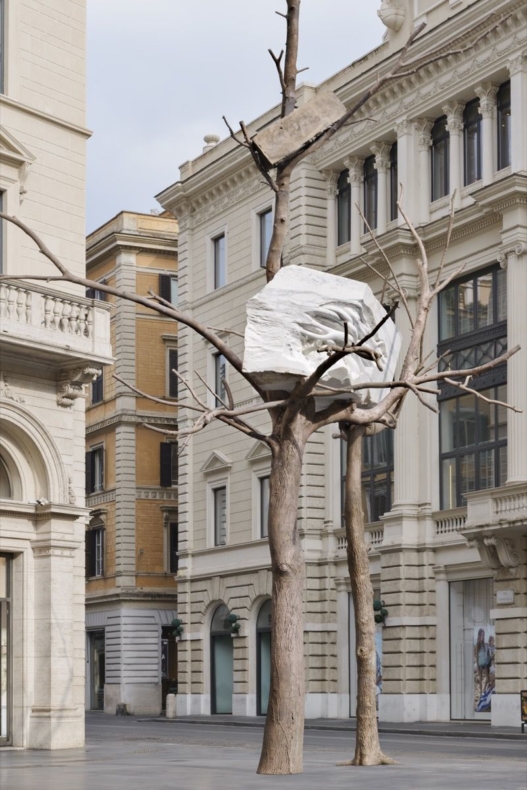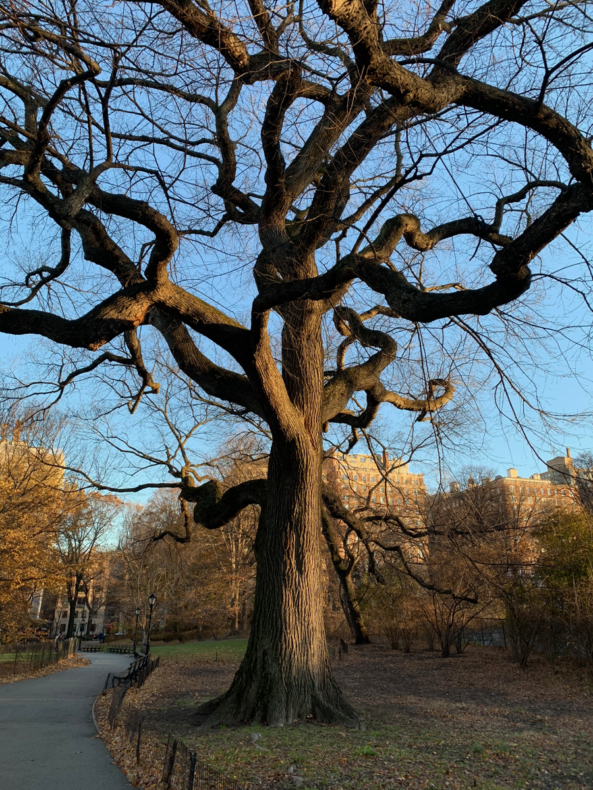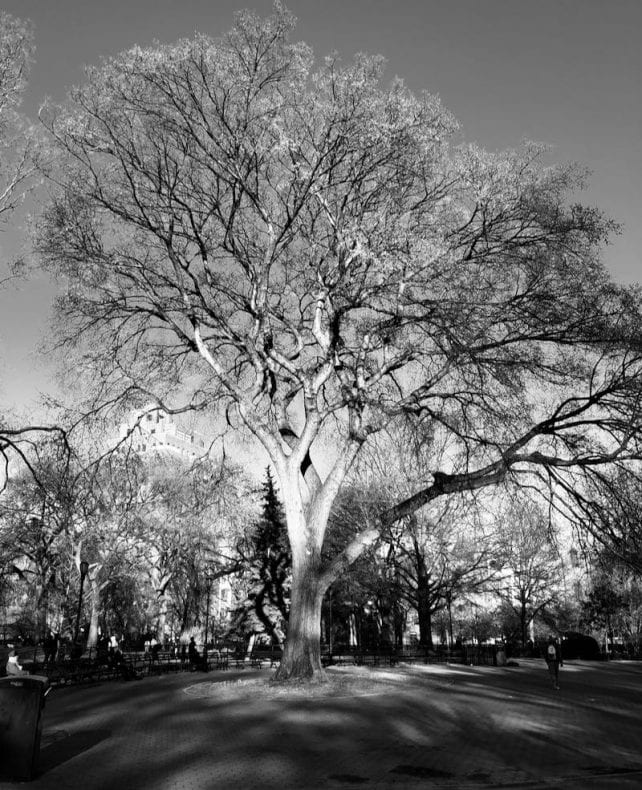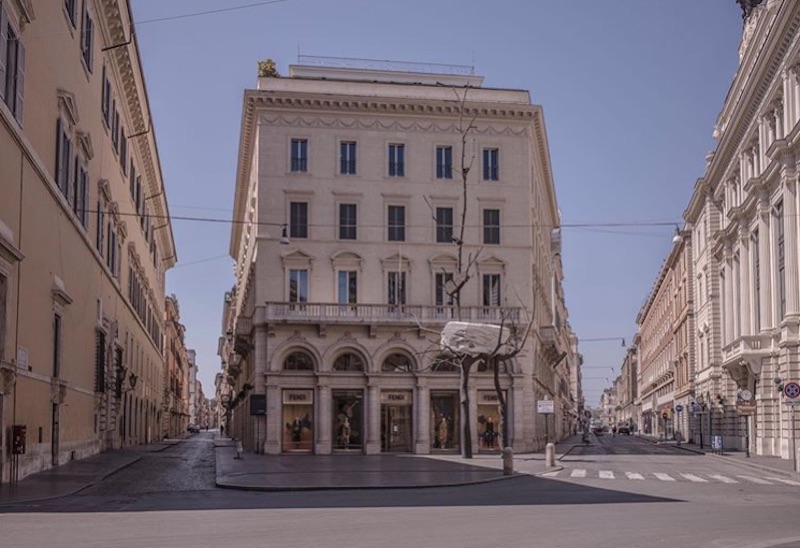In a square in Rome’s historic center stands Foglie di Pietra (Leaves of Stone), two large-scale bronze trees whose leafless branches bear a hunk of marble. It is the work of Giuseppe Penone, considered one of Italy’s greatest sculptors, whose medium has often been trees. The photographer Anton Giulio Onofri captured Penone’s sculpture for “Roma città chiusa (Rome, closed city),” a series of photographs of the empty city during the Italian lockdown commissioned by La Galleria Nazionale of Roma. Penone’s commentary about the work seem particularly fitting now:
A tree summarizes in an exemplary way the contrast between two forces: the force of gravity and the weight of life we are part of. The need and the search for balance, which exists in every living being to counteract the force of gravity, is evident in every step and in every small action of our lives. It is a river stone that appears amid the branches of a tree.

The need and the search for balance… is the concern of everyone we know, and at the heart of every conversation in this challenging time. It is a river stone that appears amid the branches of a tree. It’s as if Penone is saying: let the trees carry that weight for us, and in doing so, show us how.

It reminded us the remarkable prose poem by Hermann Hesse which first appeared in Wandering: Notes and Sketches a synthesis of prose, poetry and watercolor sketches published in 1920, and sadly, long out of print. Hesse describes just what trees do and mean. And how they are sanctuaries for us, if we only learn to…listen.
Listen to Natascha McElhone reading it. Beautiful.
For me, trees have always been the most penetrating preachers. I revere them when they live in tribes and families, in forests and groves. And even more I revere them when they stand alone. They are like lonely persons. Not like hermits who have stolen away out of some weakness, but like great, solitary men, like Beethoven and Nietzsche. In their highest boughs the world rustles, their roots rest in infinity; but they do not lose themselves there, they struggle with all the force of their lives for one thing only: to fulfill themselves according to their own laws, to build up their own form, to represent themselves. Nothing is holier, nothing is more exemplary than a beautiful, strong tree. When a tree is cut down and reveals its naked death-wound to the sun, one can read its whole history in the luminous, inscribed disk of its trunk: in the rings of its years, its scars, all the struggle, all the suffering, all the sickness, all the happiness and prosperity stand truly written, the narrow years and the luxurious years, the attacks withstood, the storms endured. And every young farmboy knows that the hardest and noblest wood has the narrowest rings, that high on the mountains and in continuing danger the most indestructible, the strongest, the ideal trees grow.
Trees are sanctuaries. Whoever knows how to speak to them, whoever knows how to listen to them, can learn the truth. They do not preach learning and precepts, they preach, undeterred by particulars, the ancient law of life.
A tree says: A kernel is hidden in me, a spark, a thought, I am life from eternal life. The attempt and the risk that the eternal mother took with me is unique, unique the form and veins of my skin, unique the smallest play of leaves in my branches and the smallest scar on my bark. I was made to form and reveal the eternal in my smallest special detail.
A tree says: My strength is trust. I know nothing about my fathers, I know nothing about the thousand children that every year spring out of me. I live out the secret of my seed to the very end, and I care for nothing else. I trust that God is in me. I trust that my labor is holy. Out of this trust I live.
When we are stricken and cannot bear our lives any longer, then a tree has something to say to us: Be still! Be still! Look at me! Life is not easy, life is not difficult. Those are childish thoughts. Let God speak within you, and your thoughts will grow silent. You are anxious because your path leads away from mother and home. But every step and every day lead you back again to the mother. Home is neither here nor there. Home is within you, or home is nowhere at all.
A longing to wander tears my heart when I hear trees rustling in the wind at evening. If one listens to them silently for a long time, this longing reveals its kernel, its meaning. It is not so much a matter of escaping from one’s suffering, though it may seem to be so. It is a longing for home, for a memory of the mother, for new metaphors for life. It leads home. Every path leads homeward, every step is birth, every step is death, every grave is mother.
So the tree rustles in the evening, when we stand uneasy before our own childish thoughts: Trees have long thoughts, long-breathing and restful, just as they have longer lives than ours. They are wiser than we are, as long as we do not listen to them. But when we have learned how to listen to trees, then the brevity and the quickness and the childlike hastiness of our thoughts achieve an incomparable joy. Whoever has learned how to listen to trees no longer wants to be a tree. He wants to be nothing except what he is. That is home. That is happiness.

Related posts:




